Unprecedented!
“When he made that famous call at 4:45 p.m. and said, ‘Good evening Mr President, I have called to congratulate you, and I concede defeat’, I was silent for quite a while because I was surprised, and he said, ‘did you hear me?’,” the president (Buhari) said.
Data Dives from Dataphyte is a reader-supported publication. To receive new posts and support my work, consider becoming a free or paid subscriber.
“Mr Buhari said he was shocked because for someone who was a deputy governor, a governor, a vice president and a president for six years to concede that easily showed Mr Jonathan’s “great sense of patriotism”.
Goodluck Jonathan was the first incumbent President of Nigeria to concede defeat to an opposition party candidate.
“Nigeria’s President, Dr Goodluck Jonathan, has called General Muhammadu Buhari to congratulate him on his “victory” in the presidential election, ahead of an official declaration.
“A former Military Head of State, General Abdulsalami Abubakar, confirmed this to State House correspondents, saying that President Goodluck Jonathan has conceded defeat to his opponent, the Presidential Candidate of the All Progressives Congress (APC)”, Channels reported 8 years ago.
President Goodluck Jonathan was also the first incumbent Nigerian president to attend the swearing-in ceremony of the candidate he had just lost to in the general elections.
Strange bedfellows orchestrated his defeat to General Muhammadu Buhari – a palette of opportunistic politicians of every hue under the heavens who invented the All Progressives Congress (APC).
That was 8 years ago. And that’s an aeon in politics.
Mr Jonathan’s gesture is now unfamiliar even in the US, the adoptive mother of democracy.
Three years ago, Mr Trump became the first US president not to attend his successor’s inauguration since 1869.
President Goodluck Ebele Jonathan bequeathed unprecedented legitimacy to his successor, a former military dictator and three-time presidential aspirant, General Muhammadu Buhari.
That legacy of legitimacy has been proudly squandered before Mr Buhari’s exit.
Nobody called the new President-elect Tinubu before INEC called the election. And none of the presidential candidates from the 2 main opposition parties – the PDP and LP has conceded defeat to Mr Buhari’s successor, Bola Tinubu or congratulated him on his win since INEC declared him the President-elect.
For instance, the Labour Party’s net gain of Senatorial seats is thought to be earned and well-deserved. At the same time, Buhari’s party, the APC, seeks to defuse the allegations that it stole the LP, PDP, and other parties’ votes for Bola Tinubu to win the presidential election.


However, PDP lost 23 Senate seats to all parties (16 to APC, 6 to LP, and 1 to the other 15 parties). These amounted to the highest loss of 23 former seats.
The party had a net loss of 5 former seats in the Senate, pending the determination of the winners of the 7 seats from Kebbi North, Plateau North, Sokoto East, Sokoto North, Sokoto South, and Yobe South.
Despite its many losses in the Senate, Tinubu’s party, the APC, still has the majority of the seats in the next Senate.
The APC has clinched the majority of 55 seats against the PDP’s 33, the LP’s 8, and the other parties 6.
So, Tinubu has access to enough legislative support to achieve his two other subliminal desires for the country besides solving food insecurity: general and interethnic insecurities.
Yet, with no opponent to yield legitimacy to Tinubu, as Jonathan did to Buhari in 2015, the best thing for him may be to purchase that legitimacy with a legacy of excellent performance.
Since his opponents are contesting his victory at the courts, none can congratulate him. So, until the crown is removed from his head, he must concentrate on the job ahead.
General Insecurity
Going by his famous funny speech on the need to incentivise the youths with Ewa and Agbado (beans and corn) to join the army and other security forces, Mr Tinubu appears worried about his country’s security situation.
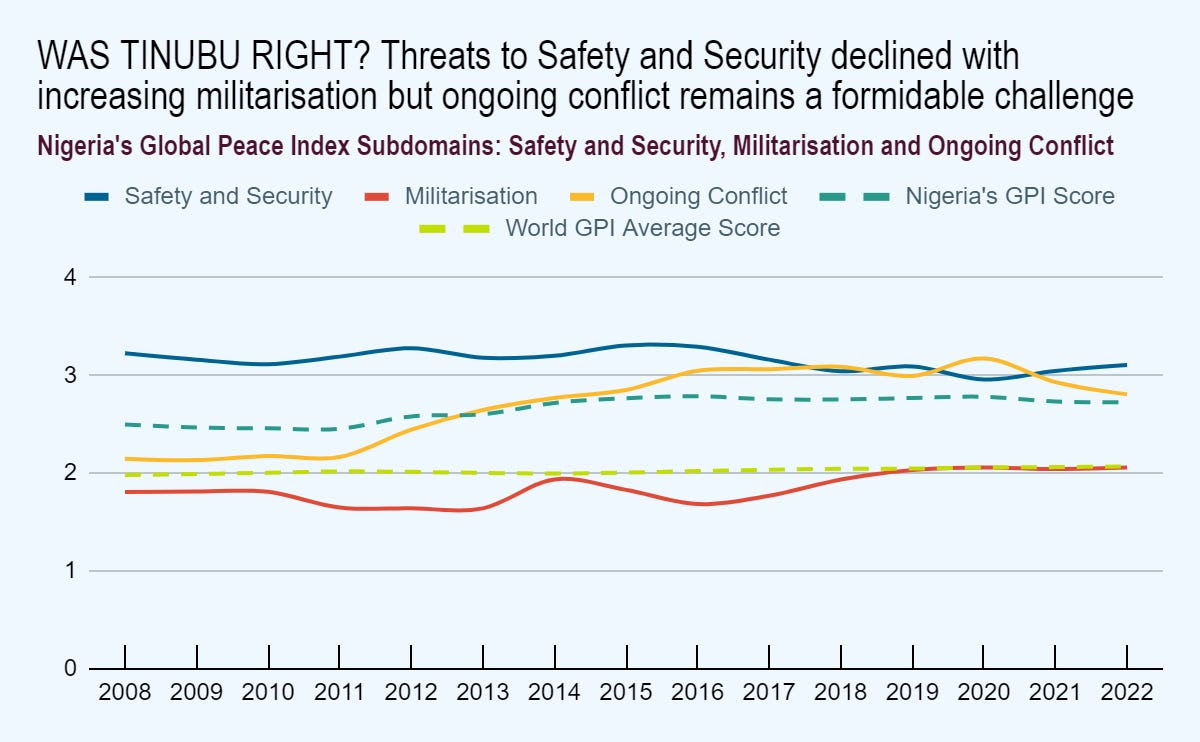
Data from the 2022 Global Peace Index shows that Tinubu’s call for increased recruitment of youths into the army may be right after all. Yet, successful soldiers and policemen worldwide need more than cassava and corn to confront hardened sociopaths.
The Global Peace Index (GPI) is “a composite index measuring the peacefulness of countries. It is made up of 23 quantitative and qualitative indicators, each weighted on a scale of 1-5. The lower the score, the more peaceful the country”, according to the Institute for Economics and Peace.
As Candidate Tinubu struggled to show us in his speech then, Nigeria’s security situation calls for serious attention. His motive looked good, but his methods came by as simplistic to many.
Nigeria ranks 6th of 163 countries on the Global Terrorism Index, trailing Afghanistan, Iraq, Somalia, Burkina Faso, and Syria. And Nigerians suffer from the scourge of terrorism more than people in Mali, Niger, Myanmar, and Pakistan.
The Global Terrorism Index (GTI) is a comprehensive study analysing the impact of terrorism for 163 countries covering 99.7 per cent of the world’s population.
Using data from Terrorism Tracker and other sources, the GTI produces a composite score to provide an ordinal ranking of countries on the impact of terrorism, according to the Institute for Economics & Peace (IEP).
“The GTI scores each country on a scale from 0 to 10, where 0 represents no impact from terrorism, and 10 represents the highest measurable impact of terrorism.”
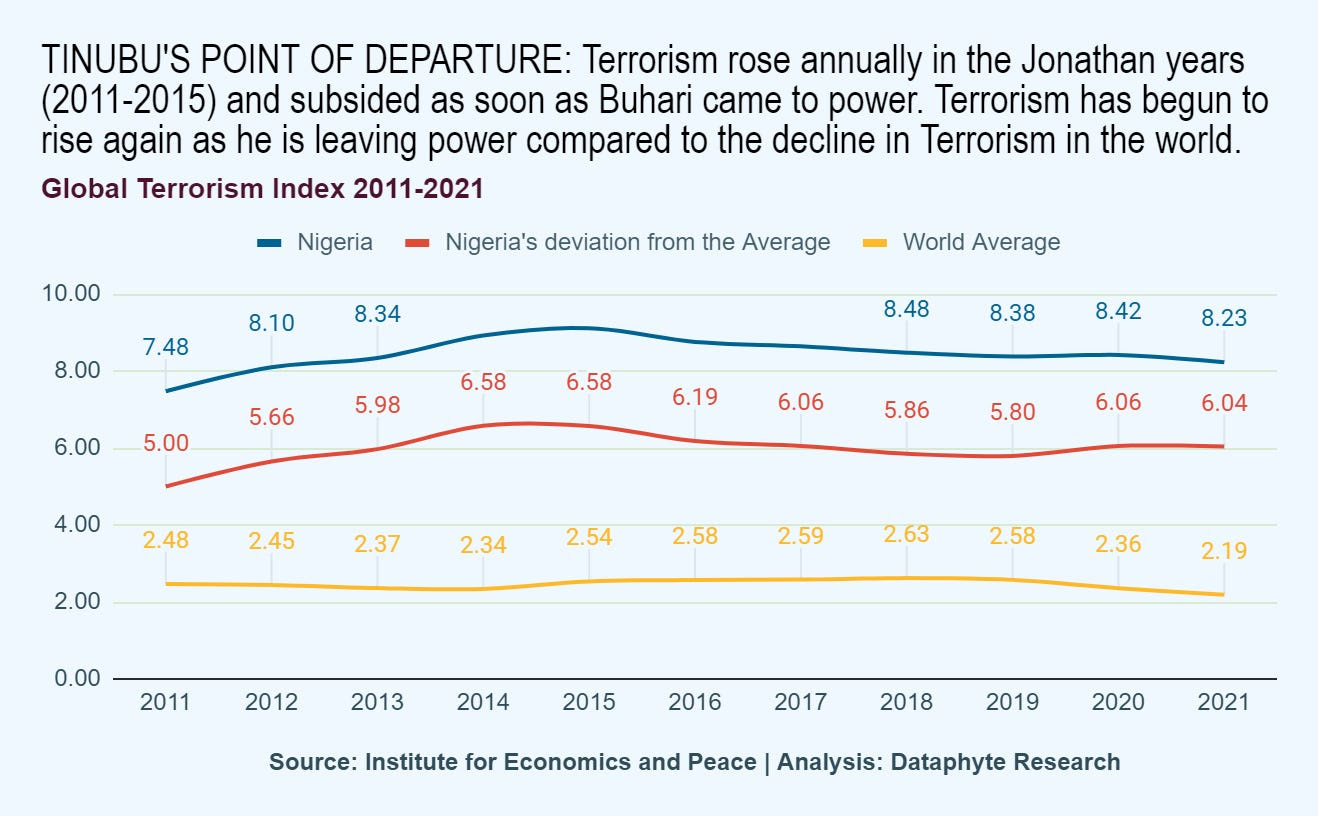
Mr Tinubu faces the twin problem of upgrading the security apparatus to keep the peace and degrading a well-funded and sophisticated terror industry.
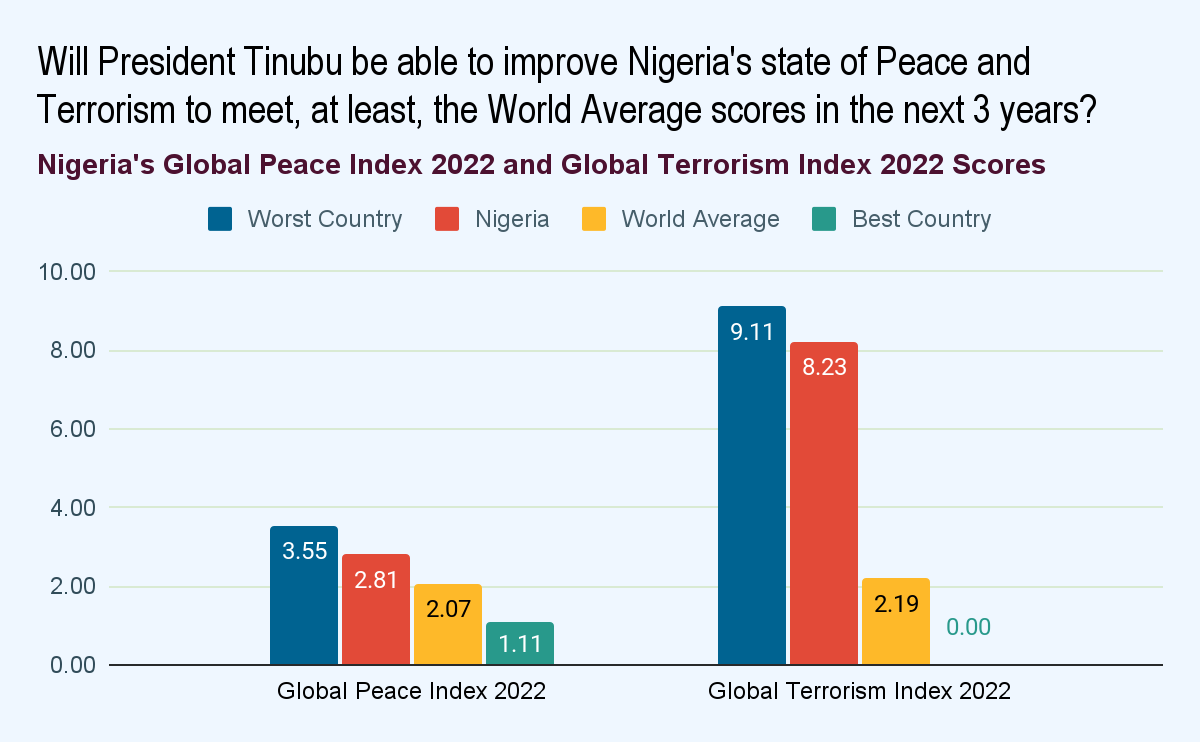
Interethnic Insecurity
As predicted by Dataphyte, the 2023 general elections bared the ethnic and religious cleavages that inhibit unity and threaten peace in the country.
Besides setting moderate targets (global average scores) for President-elect Tinubu on improving peace and tackling terrorism, the incoming governments at all levels need to map the delicate points of growing interethnic insecurities.
A well-suited index to guide here is the positive peace index.
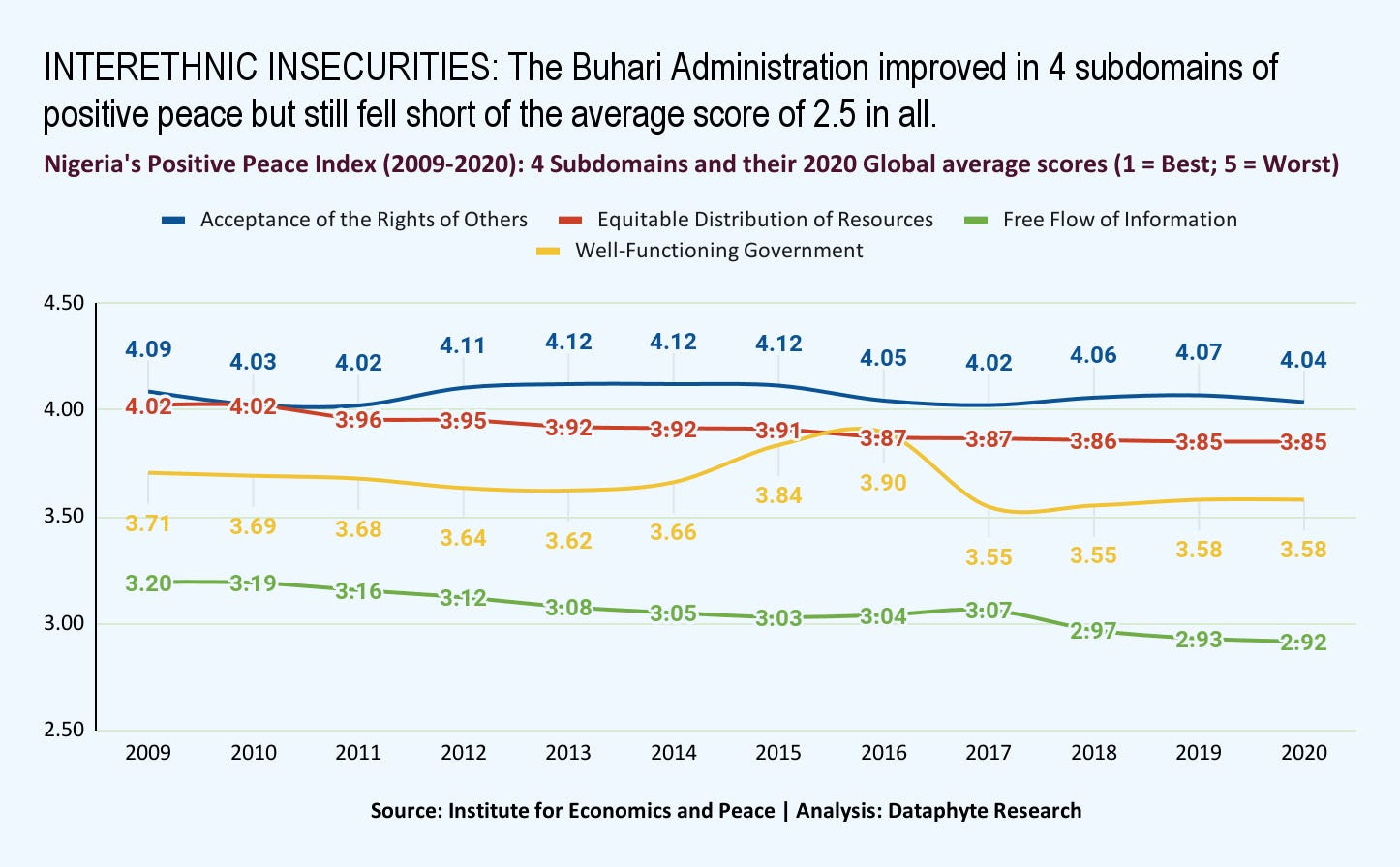
“Positive Peace is defined as the attitudes, institutions and structures that create and sustain peaceful societies. (It) measures the level of societal resilience of a nation or region accordingly.”
In measuring Positive peace, we discover that “The same factors that create lasting peace also lead to many other positive outcomes that societies aspire to.
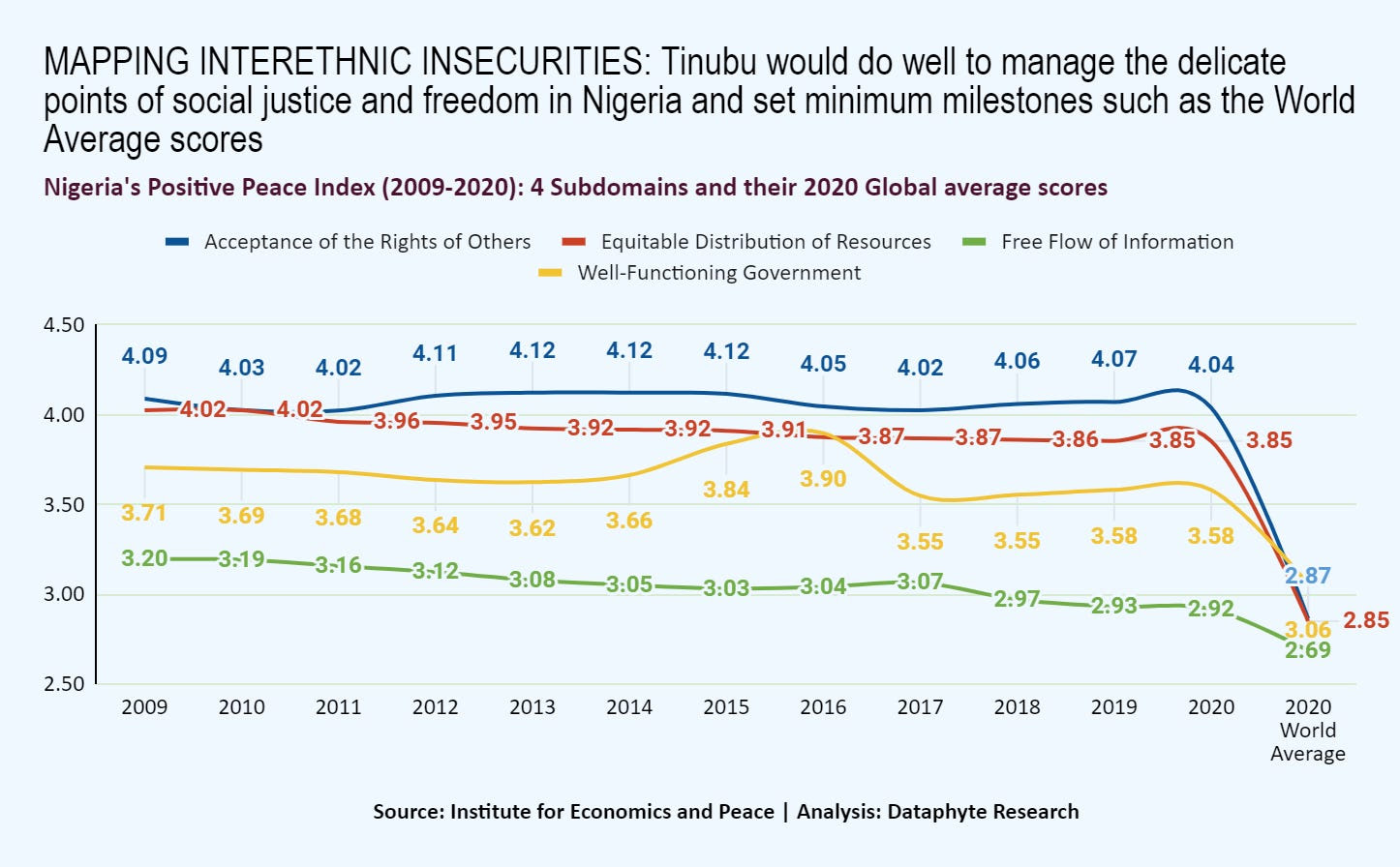
“Countries with high Positive Peace are more likely to maintain their stability and recover more easily from internal and external shocks. Through the modelling of the relationship between Positive Peace and the actual peace of a country, as measured through the Global Peace Index (GPI), it is possible to predict large falls in peace”, the IEP further explained.
To get to the root of interethnic strife in Nigeria, governments at all levels need to focus on the 8 subdomains and 24 measures of positive peace.
The people expect the Tinubu administration to do better than its predecessor in managing the delicate points of social justice and freedom across the country. Working through the intricate subdomains of positive peace could facilitate good governance, social cohesion, and economic prosperity for all.
For a man who was not served his certificate of return “a la carte”, nor indeed many of his certificates, he must brace up to surmount the enormous challenges that come with bearing the burden of 200 million people – of wearing the much-coveted crown of the President of the Federal Republic of Nigeria and serving as the Commander in Chief of its Armed Forces.
 Secret Reporters No place to hide
Secret Reporters No place to hide









